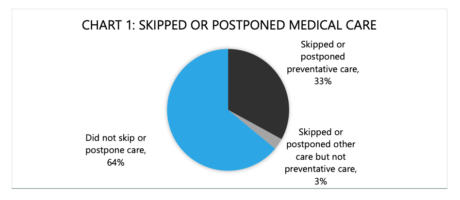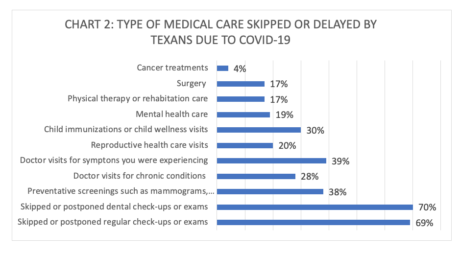
By Shao-Chee Sim
EHF’s VP for Research and Evaluation
Background
As part of the recent release of EHF’s COVID-19 in Texas Survey report, this article addresses the important issue of Texans skipping or delaying medical care during the pandemic. This issue is significant because delay or avoidance of medical care might increase the risk of morbidity and mortality associated with preventable or treatable health conditions among Texans, especially in light of the ongoing pandemic, according to Centers for Disease Control and Prevention.
Two earlier national reports have included estimates of Americans skipping or delaying medical care during the first few months of the pandemic. The Kaiser Family Foundation (KFF) Health Tracking Poll in May 2020 found that close to half of adults say they or someone in their household have postponed or skipped medical care due to the pandemic. Centers for Disease Control and Prevention estimated 41% of Americans say they have delayed or avoided seeking medical care as of June 2020. Both reports documented the impact of the pandemic on American medical care seeking behavior in the earlier months of the pandemic. The EHF survey represents the first-ever statewide survey to capture Texans’ medical care seeking behavior in August/September of 2020[1].
What Does the EHF COVID-19 in Texas Survey Find?
As shown on Chart 1, more than a third of Texans (36%) say they or someone in their household have skipped or postponed some type of medical care because of COVID-19. This includes both preventative care (33%) and non-preventative care (3%). The number shows a slight drop-off from the earlier estimates by KFF and CDC. This trend is plausible as many stay-at-home orders and business restrictions have been lifted in the state. Nonetheless, 36% is not an insignificant percentage.

Among Texans who have skipped or delayed medical care, Chart 2 reveals some troubling patterns. On the preventative care, 7 in 10 Texans skipped or postponed both regular check-ups and dental check-ups. And a sizable group of Texans put off preventative screenings and immunizations for their child. We also find many Texans skipped or delayed doctor visits for chronic conditions. The survey shows a smaller group of Texans are skipping the more serious medical procedures like surgery and cancer treatment.

Does Race/Ethnicity, Household Income and Educational Level Matter in Explaining Texans’ Medical Care Seeking Behavior During the Pandemic?
To better understand Texans’ medical care seeking behavior during the pandemic, we disaggregated the survey data by race/ethnicity, household income and educational level (see Tables One, Two and Three). For the most part, many of the responses are consistent across these 3 demographic variables. Though, we are seeing some statistically significant differences below[2]:
- Hispanic Texans were more likely to say they skipped or postponed cancer treatments than White Texans (9% vs. 3%)
- Households with income less than $75K are more likely to skip or delay doctor visits for chronic conditions such as diabetes and high blood pressure than households with more than $75K income. (34% vs. 21%)
- Texans with less than a college degree are more likely to skip or postpone doctor visits for chronic conditions than their counterparts with a college degree or more (34% vs. 17%)
Implications
These data are timely and relevant for several reasons. It is disconcerting that, six months after the pandemic started, more than one third of Texans are still skipping or delaying medical care; and 70% of those who have skipped medical care are putting off their regular and dental check-ups or exams.
Our survey also reveals alarming insights about medical care avoidance behavior of various socio-demographic groups of Texans. Hispanic Texans are more likely than White Texans to skip or postpone cancer treatments. Texans with less resources and lower educational attainment are more likely to skip or postpone doctor visits for chronic conditions.
It is important to conduct further research to better understand the underlying reasons for medical care avoidance among Texans and to study whether and in what ways telehealth and/or telemedicine can address these medical care needs.
The pandemic has already caused tremendous disruptions in our society. Knowing the enormous health, economic and social costs of continuing to delay seeking medical care, the survey findings serve as an important reminder to policymakers, regulators, medical professionals, and public health communities to formulate policies and programs to encourage Texans to seek appropriate and timely medical care, especially preventative care, as we continue to battle increasing number of COVID-19 cases in the state.
Table 1: Type of Medical Care Skipped or Delayed by Texans Due to COVID-19 by Race/Ethnicity
| Total | White | Hispanic | Black | |
| Skipped or postponed regular check-ups of exams | 69% | 66% | 70% | 77% |
| Skipped or postponed dental check-ups of exams | 70% | 68% | 73% | 65% |
| Preventative screenings such as mammograms, colonoscopies, or other screenings | 38% | 41% | 37% | 31% |
| Doctor visits for chronic conditions such as diabetes and high blood conditions | 28% | 29% | 29% | 25% |
| Doctor visits for symptoms you were experiencing | 39% | 37% | 44% | 43% |
| Reproductive health care visits | 20% | 18% | 23% | 15% |
| Immunizations for your child or other child wellness visits | 30% | 23% | 30% | 28% |
| Mental health care | 19% | 22% | 17% | 12% |
| Physical therapy or rehabilitation care | 17% | 14% | 21% | 16% |
| Surgery | 17% | 16% | 18% | 11% |
| Cancer treatments* | 4% | 3% | 9% | 1% |
*Denotes statistically significant difference between Hispanic Texans and White Texans at p<.05
Table 2: Type of Medical Care Skipped or Delayed by Texans Due to COVID-19 by Household Income
| Total | Under $75K | $75K + | |
| Skipped or postponed regular check-ups of exams | 69% | 71% | 70% |
| Skipped or postponed dental check-ups of exams | 70% | 69% | 71% |
| Preventative screenings such as mammograms, colonoscopies, or other screenings | 38% | 37% | 39% |
| Doctor visits for chronic conditions such as diabetes and high blood conditions* | 28% | 34% | 21% |
| Doctor visits for symptoms you were experiencing | 39% | 43% | 38% |
| Reproductive health care visits | 20% | 33% | 29% |
| Immunizations for your child or other child wellness visits | 30% | 26% | 16% |
| Mental health care | 19% | 19% | 15% |
| Physical therapy or rehabilitation care | 17% | 18% | 15% |
| Surgery | 17% | 19% | 16% |
| Cancer treatments | 4% | 5% | 4% |
*Denotes statistically significant difference between Households with income less than $75K and households with income more than $75K at p<.05.
Table 3: Type of Medical Care Skipped or Delayed by Texans Due to COVID-19 by Educational Level
| Total | Less than college | College+ | |
| Skipped or postponed regular check-ups of exams | 69% | 68% | 73% |
| Skipped or postponed dental check-ups of exams | 70% | 68% | 72% |
| Preventative screenings such as mammograms, colonoscopies, or other screenings | 38% | 36% | 42% |
| Doctor visits for chronic conditions such as diabetes and high blood conditions* | 28% | 34% | 17% |
| Doctor visits for symptoms you were experiencing | 39% | 43% | 33% |
| Reproductive health care visits | 20% | 18% | 25% |
| Immunizations for your child or other child wellness visits | 30% | 31% | 29% |
| Mental health care | 19% | 17% | 23% |
| Physical therapy or rehabilitation care | 17% | 19% | 14% |
| Surgery | 17% | 18% | 16% |
| Cancer treatments | 4% | 6% | 2% |
*Denotes statistically significant difference between Texans with less than a college degree and Texans with a college degree at p<.05.
[1] See an explanation of the methodology via EHF Texas COVID-19 Survey Report
[2] We could not highlight differences between Black Texans and White Texans as the sample size for Black Texans who have skipped /postponed medical care is too small (n=83). While the differences may seem large in terms of percentage points, the small sample size means that we cannot be confident in whether the result is statistically significant. The statistical significance testing considers not only the size of the difference but also the size of the two groups being compared.